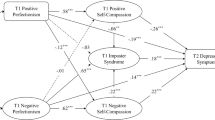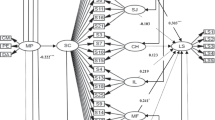Abstract
To better understand the perfectionism-depression link, this study aimed to explore the moderating role of self-compassion in the relationship between perfectionism and depression. To gauge the impacts of self-compassion and perfectionism on depression, researchers assessed 210 depressed inpatients in four hospitals in Iran. The results of the Structural Equation Modelling showed that personal standards perfectionism and self-compassion negatively predicted depression, and evaluative concerns perfectionism positively predicted depression. Results from a multi-group analysis suggested that self-compassion moderated the relationship between evaluative concerns perfectionism and depression. However, it has no moderation effect on personal standards perfectionism and depression. The findings showed that self-compassion could decrease the effects of evaluative concerns perfectionism on depression.

Similar content being viewed by others
References
Abdollahi, A. (2019). The association of rumination and perfectionism to social anxiety. Psychiatry, 82, 345–353.
Abdollahi, A., Hosseinian, S., & Asmundson, G. J. G. (2018). Coping styles mediate perfectionism associations with depression among undergraduate students. Journal of General Psychology, 145(1), 93–105. https://doi.org/10.1080/00221309.2017.1421137.
Abdollahi, A., LeBouthillier, D. M., Najafi, M., Asmundson, G. J. G., Hosseinian, S., Shahidi, S., et al. (2017). Effect of exercise augmentation of cognitive behavioural therapy for the treatment of suicidal ideation and depression. Journal of Affective Disorders, 219(9), 58–63. https://doi.org/10.1016/j.jad.2017.05.012.
Arbuckle, J. L. (2006). Amos (version 20)[computer program]. Chicago: IBM, SPSS.
Azizi, A., Mohammadkhani, P., Lotfi, S., & Bahramkhani, M. (2013). The validity and reliability of the Iranian version of the Self-Compassion Scale. Practice in Clinical Psychology, 1(3), 149–155.
Beck, A. T. (2008). The evolution of the cognitive model of depression and its neurobiological correlates. American Journal of Psychiatry, 165(8), 969–977.
Beck, A. T., Steer, R. A., & Brown, G. K. (1996). Beck depression inventory-II. San Antonio, 78(2), 490–498.
Burns, D. D. (1980). The perfectionist’s script for self-defeat. Psychology Today, 14(6), 34–52.
Byrne, B. M. (2013). Structural equation modeling with Mplus: Basic concepts, applications, and programming. Abingdon: Routledge, Taylor&Francis.
Campbell, K. (2017). Exploring the role of self-compassion and perfectionism in the prediction of psychological distress and psychological well-being in adolescents: a research portfolio. The University of Edinburgh.
Dunkley, D. M., Blankstein, K. R., Masheb, R. M., & Grilo, C. M. (2006). Personal standards and evaluative concerns dimensions of “clinical” perfectionism: A reply to Shafran et al. (2002, 2003) and Hewitt et al. (2003). Behaviour Research and Therapy, 44(1), 63–84.
Ellis, A. (1994). Reason and emotion in psychotherapy: Revised and updated. New York: Birch Lane.
Ferrari, M., Yap, K., Scott, N., Einstein, D. A., & Ciarrochi, J. (2018). Self-compassion moderates the perfectionism and depression link in both adolescence and adulthood. PLoS One, 13(2), 1–19. https://doi.org/10.1371/journal.pone.0192022.
Flett, G. L., Galfi-pechenkov, I., Molnar, D. S., Hewitt, P. L., & Goldstein, A. L. (2012). Perfectionism, mattering, and depression : A mediational analysis. Personality and Individual Differences, 52(7), 828–832. https://doi.org/10.1016/j.paid.2011.12.041.
Frost, R. O., Marten, P., Lahart, C., & Rosenblate, R. (1990). The dimensions of perfectionism. Cognitive Therapy and Research, 14(5), 449–468.
Ghorbandordinejad, F. (2014). Examining the relationship between students’ levels of perfectionism and their achievements in english learning. Research in English Language Pedagogy, 2(2), 36–45.
Hair, J. F., Black, W. C., Babin, B. J., & Anderson, R. E. (2010). Multivariate data analysis. A global perspective (7th ed.). Upper Saddle River, NJ: Prentice Hall.
Hamachek, D. E. (1978). Psychodynamics of normal and neurotic perfectionism. Psychology: A Journal of Human Behavior, 15(1), 27–33.
Hewitt, P. L., & Flett, G. L. (1991). Perfectionism in the self and social contexts: Conceptualization, assessment, and association with psychopathology. Journal of Personality and Social Psychology, 60(3), 456.
Hiçdurmaz, D., & Aydin, A. (2017). The relationship between nursing students’ self-compassion and multidimensional perfectionism levels and the factors that influence them. Journal of Psychiatric Nursing/Psikiyatri Hemsireleri Dernegi, 8(2), 86–94.
Jackson, D. L. (2003). Revisiting sample size and number of parameter estimates: Some support for the N: q hypothesis. Structural Equation Modeling, 10(1), 128–141.
Kline, R. B. (2005). Principles and Practice of Structural Equation Modeling (3nd ed.). New York, NY: The Guilford.
Levine, S. L., Green-Demers, I., Werner, K. M., & Milyavskaya, M. (2019). Perfectionism in adolescents: Self-critical perfectionism as a predictor of depressive symptoms across the school year. Journal of Social and Clinical Psychology, 38(1), 70–86.
Mehr, K. E., & Adams, A. C. (2016). Self-compassion as a mediator of maladaptive perfectionism and depressive symptoms in college students. Journal of College Student Psychotherapy, 30(2), 132–145.
Mohammadi, M.-R., Ghanizadeh, A., Rahgozart, M., Noorbala, A. A., Malekafzali, H., Davidian, H., et al. (2005). Suicidal attempt and psychiatric disorders in Iran. Suicide and Life-Threatening Behavior, 35(3), 309–316.
Neff, K. (2003a). Self-compassion: An alternative conceptualization of a healthy attitude toward oneself. Self and Identity, 2(2), 85–101.
Neff, K. D. (2003b). The development and validation of a scale to measure self-compassion. Self and Identity, 2(3), 223–250.
Neff, K. D. (2011). Self-compassion, self-esteem, and well-being. Social and Personality Psychology Compass, 5(1), 1–12.
Neff, K. D. (2016). The self-compassion scale is a valid and theoretically coherent measure of selfcompassion. Mindfulness, 7(1), 264–274.
Neff, K. D., Kirkpatrick, K. L., & Rude, S. S. (2007a). Self-compassion and adaptive psychological functioning. Journal of Research in Personality, 41(1), 139–154.
Neff, K. D., & McGehee, P. (2010). Self-compassion and psychological resilience among adolescents and young adults. Self and Identity, 9(3), 225–240.
Neff, K. D., Rude, S. S., & Kirkpatrick, K. L. (2007b). An examination of self-compassion in relation to positive psychological functioning and personality traits. Journal of Research in Personality, 41(4), 908–916.
Park, H., & Jeong, D. Y. (2016). Moderation effects of perfectionism and meaning in life on depression. Personality and Individual Differences, 98, 25–29.
Preacher, K. J., & Hayes, A. F. (2008). Asymptotic and resampling strategies for assessing and comparing indirect effects in multiple mediator models. Behavior Research Methods, 40(3), 879–891. https://doi.org/10.3758/BRM.40.3.879.
Rice, K. G., Leever, B. A., Christopher, J., & Porter, J. D. (2006). Perfectionism, stress, and social (dis) connection: A short-term study of hopelessness, depression, and academic adjustment among honors students. Journal of Counseling Psychology, 53(4), 524.
Richardson, C. M. E., Trusty, W. T., & George, K. A. (2018). Trainee wellness: Self-critical perfectionism, self-compassion, depression, and burnout among doctoral trainees in psychology. Counselling Psychology Quarterly. https://doi.org/10.1080/09515070.2018.1509839.
Shafran, R., Cooper, Z., & Fairburn, C. G. (2003). “Clinical perfectionism” is not “multidimensional perfectionism”: A reply to Hewitt, Flett, Besser, Sherry & McGee. Behaviour Research and Therapy, 41(10), 1217–1220.
Sherry, D. L., Sherry, S. B., Hewitt, P. L., Mushquash, A., & Flett, G. L. (2015). The existential model of perfectionism and depressive symptoms: Tests of incremental validity, gender differences, and moderated mediation. Personality and Individual Differences, 76, 104–110.
Slaney, R. B., Rice, K. G., Mobley, M., Trippi, J., & Ashby, J. S. (2001). The revised almost perfect scale. Measurement and Evaluation in Counseling and Development, 34(1), 130–145.
Smith, M. M., Sherry, S. B., Rnic, K., Saklofske, D. H., Enns, M., & Gralnick, T. (2016). Are perfectionism dimensions vulnerability factors for depressive symptoms after controlling for neuroticism? A meta-analysis of 10 longitudinal studies. European Journal of Personality, 30(2), 201–212. https://doi.org/10.1002/per.2053.
Terry, M. L., Leary, M. R., & Mehta, S. (2013). Self-compassion as a buffer against homesickness, depression, and dissatisfaction in the transition to college. Self and Identity, 12(3), 278–290. https://doi.org/10.1080/15298868.2012.667913.
Tran, L., & Rimes, K. A. (2017). Unhealthy perfectionism, negative beliefs about emotions, emotional suppression, and depression in students: A mediational analysis. Personality and Individual Differences, 110, 144–147.
Wong, C. C. Y., & Mak, W. W. S. (2013). Differentiating the role of three self-compassion components in buffering cognitive-personality vulnerability to depression among Chinese in Hong Kong. Journal of Counseling Psychology, 60(1), 162–169. https://doi.org/10.1037/a0030451.
World Health Organization. (2015). Depression. Retrieved from http://www.who.int/topics/depression/en/.
Zhou, X., Zhu, H., Zhang, B., & Cai, T. (2013). Perceived social support as moderator of perfectionism, depression, and anxiety in college students. Social Behavior and Personality: An International Journal, 41(7), 1141–1152.
Funding
This study was not received funding for this work.
Author information
Authors and Affiliations
Corresponding author
Ethics declarations
Conflict of interest
The author(s) asserted no potential conflicts of interest with respect to the research, authorship, and/or publication of this article.
Ethical Approval
All procedures performed in studies involving human participants were in accordance with the ethical standards of the institutional and/or national research committee and with the 1964 Helsinki declaration and its later amendments or comparable ethical standards.
Informed Consent
Informed consent was obtained from all individual participants included in the study.
Additional information
Publisher's Note
Springer Nature remains neutral with regard to jurisdictional claims in published maps and institutional affiliations.
Rights and permissions
About this article
Cite this article
Abdollahi, A., Allen, K.A. & Taheri, A. Moderating the Role of Self-Compassion in the Relationship Between Perfectionism and Depression. J Rat-Emo Cognitive-Behav Ther 38, 459–471 (2020). https://doi.org/10.1007/s10942-020-00346-3
Published:
Issue Date:
DOI: https://doi.org/10.1007/s10942-020-00346-3




